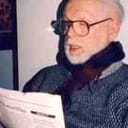Stay in the Loop
BSR publishes on a weekly schedule, with an email newsletter every Wednesday and Thursday morning. There’s no paywall, and subscribing is always free.
Limousine proletarian
Poet Philip Levine's working-class credentials

When the alleged "proletarian poet" Philip Levine was designated America's new poet laureate (from October to next May), champions of the expanding underclasses cheered. Including me: Levine and I grew up together in the '30s and '40s, when Detroit set a good example of mass production with newly strong labor unions for the entire industrialized world.
In those days both Levine and I worked blue-collar jobs to finance our doctorates. In my case, the experience taught me that there are more boring things than grading and correcting papers. My takes included the night shift at the Wonder Bread Bakery, where I monitored a fleet of giant wheeled vehicles in which the dough was rising, often overflowing onto the filthy floors, whereupon I scooped up the dirty dough and heisted it back into the vats.
At Lincoln-Mercury I supervised the spot welding of the basic car frame, the first step in these vehicles' mass production. I sold shoes to poor black women in a downtown lower class department store. I worked the midnight shift at the Chrysler plant in Hamtramck, where I monitored the noisiest stamping machine I've ever encountered. I squirted glue under the rubber floors of new Chevrolet station wagons at Fisher Body in Cleveland. I hoisted harvested peas for a shucking machine in Bay City. I worked as a janitor for an East Lansing bank before I got my first teaching job.
"'Dunnit in the bathtub?'
But I relished the experience of hobnobbing with blue collars (some of whom, to be sure, were grad students just like me). I still remember the Italian fella in Cleveland who asked the newly married me, daily, "Have you dunnit in the bathtub yet?" Looking back 60 years, I learned more there about class and social aspiration than all the sociology texts I ultimately labored through.
I assumed Levin shared my feelings. But the recent hoopla over this people's poet motivated me to read for the first time Levine's not entirely successful autobiography, The Bread of Time. Reading it substantially changed my estimation of his importance as a working class poet.
Levine's drawing room anarchism, which bloomed as he identified with the losers in Spain's Civil War during a long visit to Barcelona, struck me as an affectation rather than a philosophy of life. And his post-appointment proposal to hold a competition for Ugliest Poem, as well as his comment that he didn't give a shit if The People didn't "go" for Poetry with a Capital "P," struck me as adolescent as Tea Party twaddle. In my judgment, Levine comes across as no Dorothy Day idealist, but an anarchical climber whose shtick is identifying with the abused workers.
(The most interesting parts of The Bread of Time were Levine's contempt for his Iowa instructor Robert Lowell and his complementary respect for his other professor, the Minnesota poet John Berryman.)
Forgotten in Detroit
In the wake of Levine's nomination, the London Guardian reported an astonishing run on his books on Amazon. I can imagine an idiosyncratically illiterate literatus rushing to find what the fuss was about.
In Levine's hometown, meanwhile, the two Detroit dailies could only come up with a casual local comment about him, plus an obituary prepared by a wire service. Which shouldn't be surprising: When Levine and I left Detroit— he for Fresno and I for Philly— there were nearly two million Detroiters. Now that embattled city is fast approaching 700,000, more than 80% black— not exactly Levine's constituency. Those struggling souls and their community could use some good poets right now. But Levine has other fish to fry.♦
To read responses, click here.
In those days both Levine and I worked blue-collar jobs to finance our doctorates. In my case, the experience taught me that there are more boring things than grading and correcting papers. My takes included the night shift at the Wonder Bread Bakery, where I monitored a fleet of giant wheeled vehicles in which the dough was rising, often overflowing onto the filthy floors, whereupon I scooped up the dirty dough and heisted it back into the vats.
At Lincoln-Mercury I supervised the spot welding of the basic car frame, the first step in these vehicles' mass production. I sold shoes to poor black women in a downtown lower class department store. I worked the midnight shift at the Chrysler plant in Hamtramck, where I monitored the noisiest stamping machine I've ever encountered. I squirted glue under the rubber floors of new Chevrolet station wagons at Fisher Body in Cleveland. I hoisted harvested peas for a shucking machine in Bay City. I worked as a janitor for an East Lansing bank before I got my first teaching job.
"'Dunnit in the bathtub?'
But I relished the experience of hobnobbing with blue collars (some of whom, to be sure, were grad students just like me). I still remember the Italian fella in Cleveland who asked the newly married me, daily, "Have you dunnit in the bathtub yet?" Looking back 60 years, I learned more there about class and social aspiration than all the sociology texts I ultimately labored through.
I assumed Levin shared my feelings. But the recent hoopla over this people's poet motivated me to read for the first time Levine's not entirely successful autobiography, The Bread of Time. Reading it substantially changed my estimation of his importance as a working class poet.
Levine's drawing room anarchism, which bloomed as he identified with the losers in Spain's Civil War during a long visit to Barcelona, struck me as an affectation rather than a philosophy of life. And his post-appointment proposal to hold a competition for Ugliest Poem, as well as his comment that he didn't give a shit if The People didn't "go" for Poetry with a Capital "P," struck me as adolescent as Tea Party twaddle. In my judgment, Levine comes across as no Dorothy Day idealist, but an anarchical climber whose shtick is identifying with the abused workers.
(The most interesting parts of The Bread of Time were Levine's contempt for his Iowa instructor Robert Lowell and his complementary respect for his other professor, the Minnesota poet John Berryman.)
Forgotten in Detroit
In the wake of Levine's nomination, the London Guardian reported an astonishing run on his books on Amazon. I can imagine an idiosyncratically illiterate literatus rushing to find what the fuss was about.
In Levine's hometown, meanwhile, the two Detroit dailies could only come up with a casual local comment about him, plus an obituary prepared by a wire service. Which shouldn't be surprising: When Levine and I left Detroit— he for Fresno and I for Philly— there were nearly two million Detroiters. Now that embattled city is fast approaching 700,000, more than 80% black— not exactly Levine's constituency. Those struggling souls and their community could use some good poets right now. But Levine has other fish to fry.♦
To read responses, click here.
Sign up for our newsletter
All of the week's new articles, all in one place. Sign up for the free weekly BSR newsletters, and don't miss a conversation.

 Patrick D. Hazard
Patrick D. Hazard